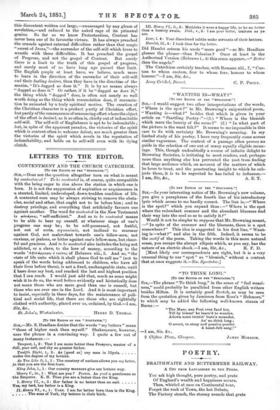LETTERS TO THE EDITOR.
CONTENTMENT AND THE CHURCH CATECHISM.
(To THE EDITOR OP THE " SPECTATOR."] -Sni.,—Does not the question altogether turn on what is meant by contentment ? To be contented is, of course, quite compatible with the being eager to rise above the station in which one is born. It is not the suppression of aspiration or acquiescence in -a stunted, limited, undeveloped, down-trodden condition of life. A contented man may be always striving to remove the obsta- cles, social and other, that ought not to be before him ; and to destroy privilege, and everything that artificially favours one against another. The word for contented in the New Testament is samipxer, "self-sufficient." And so to be contented means -to be able to bear up oneself, at whatever stage of one's progress one may. be ; to be self-possessed, not fretful, not out of sorts, cequanimis, not inclined to murmur against God, not malevolent towards one's fellow-men, not -envious, or jealous, or bitter against one's fellow-men, but cheer- ful and gracious. And to be contented also includes the being not addicted, or a slave, to the love of money, according to the words ' Acpagipyupoc d Tpiwo; of Hebrews xiii., 5. And so, "the -state of life unto which it shall please God to call me" (not to speak of the words being addressed to children, who have all their lives before them), is not a fixed, unchangeable state, until have done my best, and reached the last and highest position that I can reach. I would just add that, much as some might *wish it to do so, the word betters evidently and historically does not mean those who are more good than one is oneself, but those who are over one in the Lord. And it is moat important to insist, especially in these days, for the maintenance of poli- tical and social life, that there are those who are rightfully .clothed with authority, placed over us, ordained, by God.—I am, Sir, &c.,


































 Previous page
Previous page